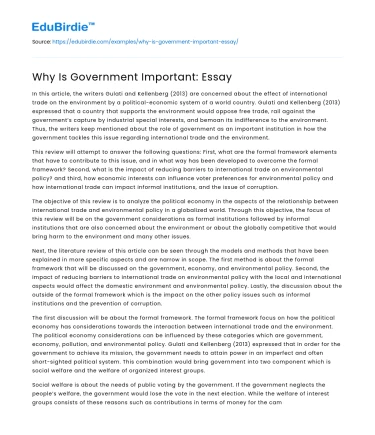Introduction
The concept of government is integral to the organization and functioning of society. Governments are established to create order, provide security, and facilitate the welfare of their citizens. They set the framework within which societies operate and develop, ensuring the rule of law, economic stability, and social justice. The necessity of government can be traced back to the earliest civilizations where organized structures were required to manage resources, resolve conflicts, and protect communities. As Thomas Hobbes famously posited, the absence of government would lead to a "state of nature" characterized by chaos and disorder (Hobbes, 1651). In modern times, the role of government has expanded to address complex global challenges such as climate change, economic inequality, and international security. This essay aims to explore why government is crucial, examining its functions in maintaining order, promoting economic stability, and ensuring social justice while addressing potential counter-arguments to reinforce this thesis.
Maintaining Order and Security
One of the primary reasons for the establishment of government is to maintain order and security within society. Governments enact laws that dictate acceptable behavior, creating a framework that allows individuals to coexist peacefully. Law enforcement agencies, such as the police and judiciary, are empowered to ensure compliance with these laws, protecting citizens from crime and violence. For instance, the establishment of the modern police force in the 19th century significantly reduced crime rates in urban areas, illustrating the government's role in maintaining public order (Reith, 1956). Moreover, governments are responsible for national defense, safeguarding a nation's sovereignty against external threats. The existence of a structured military and diplomatic corps serves as a deterrent to potential aggressors, maintaining stability in international relations. Critics may argue that government power can lead to authoritarianism; however, democratic systems with checks and balances are designed to prevent such overreach while ensuring the protection and security of citizens.
Save your time!
We can take care of your essay
- Proper editing and formatting
- Free revision, title page, and bibliography
- Flexible prices and money-back guarantee
The transition from a hypothetical state of anarchy to a structured society underscores the necessity of government intervention in ensuring order. Without a governing body, society would likely experience increased violence and instability, as individuals act in self-interest without regard for communal welfare. The presence of a government provides a centralized authority that can mediate disputes and administer justice, maintaining social order and protecting citizens' rights.
Promoting Economic Stability
Governments play a pivotal role in promoting economic stability by implementing policies that foster growth and development. Through regulation and oversight, governments ensure fair competition, protect consumer rights, and prevent market failures. For example, the financial regulations implemented after the 2008 economic crisis were crucial in restoring confidence in global markets and preventing future collapses. Additionally, governments invest in infrastructure, education, and healthcare, providing a foundation for economic prosperity. Keynesian economic theory supports government intervention during economic downturns, advocating for public spending to stimulate demand and create jobs (Keynes, 1936). While free-market proponents may argue that government intervention stifles innovation, evidence suggests that strategic government initiatives can complement private sector efforts, leading to sustainable economic growth.
The transition from economic instability to stability highlights the importance of government in creating an environment conducive to growth. Without governmental oversight and intervention, economies are prone to cycles of boom and bust, leading to widespread unemployment and hardship. A well-functioning government can implement monetary and fiscal policies that stabilize the economy, ensuring long-term prosperity.
Ensuring Social Justice
Another critical function of government is to ensure social justice, which involves promoting equality and protecting the rights of marginalized groups. Governments enact policies that address social inequalities, providing access to education, healthcare, and housing for all citizens. Social welfare programs, such as unemployment benefits and food assistance, are designed to support individuals facing economic hardship, reducing poverty and promoting social cohesion. The Civil Rights Act of 1964 in the United States is a prime example of government action to eliminate discrimination and promote equality (U.S. Congress, 1964). Critics may assert that government involvement in social issues leads to dependency; however, empirical evidence shows that social safety nets are essential for maintaining a healthy and productive society.
The transition from social injustice to justice is facilitated by a government committed to protecting the rights of all citizens. Without governmental intervention, systemic inequalities would persist, hindering social progress and leading to societal unrest. A government that prioritizes social justice fosters an inclusive society where all individuals have the opportunity to thrive.
Conclusion
In conclusion, the importance of government in society cannot be overstated. From maintaining order and security to promoting economic stability and ensuring social justice, governments are essential in creating a structured and equitable society. While there are valid concerns about government overreach, the benefits of a well-functioning government far outweigh the potential drawbacks. By addressing counter-arguments and demonstrating the positive impact of government, this essay underscores the necessity of government as a central pillar of society. As the world continues to face complex challenges, the role of government will remain crucial in navigating these issues and fostering a better future for all.






 Stuck on your essay?
Stuck on your essay?

